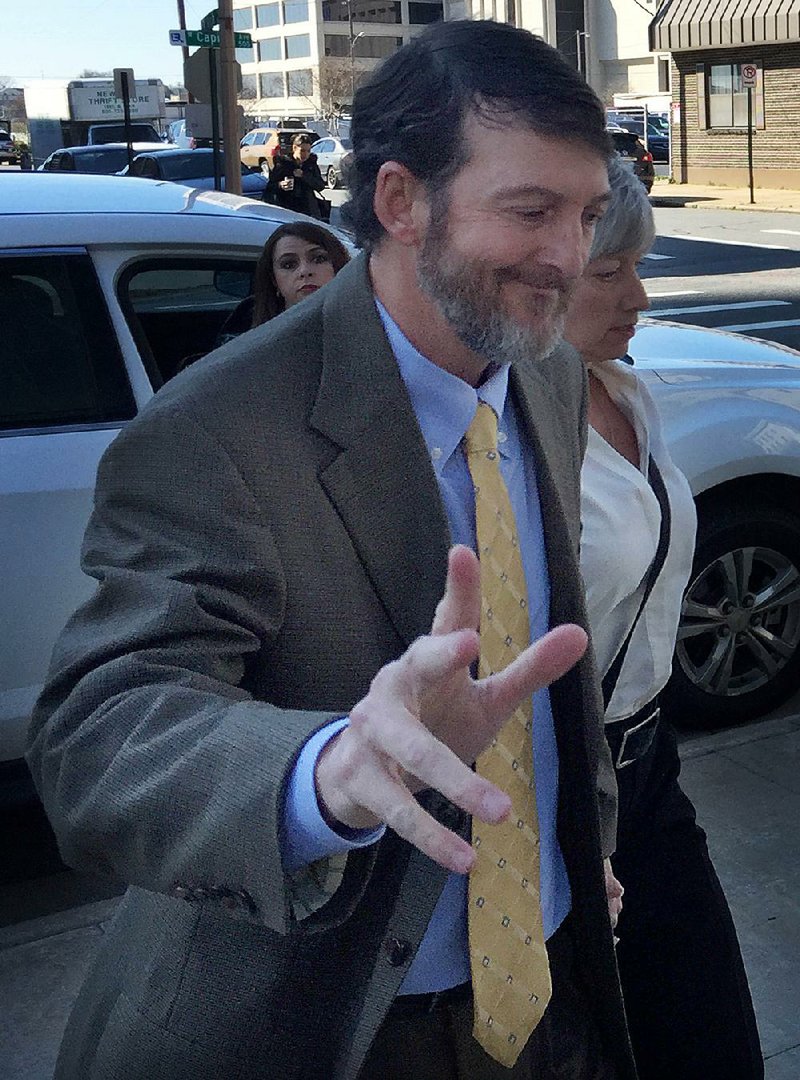A federal judge said Friday that his decision on whether to allow former Circuit Judge Michael Maggio to withdraw a guilty plea hinges solely on whether the federal bribery statute under which Maggio was charged can legally apply in the case.
After hearing arguments from both sides, U.S. District Judge Brian Miller said he will rule within a couple of weeks.
Maggio, 54, admitted in his Jan. 9, 2015, plea agreement that he had lowered a Faulkner County jury's $5.2 million judgment in a negligence lawsuit against a Greenbrier nursing home to $1 million in exchange for contributions made indirectly to his campaign for the Arkansas Court of Appeals.
The Arkansas Supreme Court ordered Maggio removed from office in September 2014 because of unrelated issues.
Maggio's attorney, James Hensley Jr., told Miller on Friday that he did not believe the federal court in Little Rock "had jurisdiction to accept the plea."
"Mr. Maggio never had anything to do with money that came from the federal government," Hensley said.
Hensley did not pursue a past argument that Maggio's former attorneys had provided ineffective counsel. Had he done so, the prosecution might have called them to testify.
Despite Maggio's law background, Hensley said Maggio didn't understand the bribery statute when he pleaded guilty. Maggio came to understand it after they began conferring a couple of months ago, Hensley said.
"Judge Maggio feels terrible about what happened," Hensley said. "He shamed his family."
Now, Hensley said, "Mr. Maggio wants to make sure that the rules are followed."
Assistant U.S. Attorney Julie Peters said Maggio stipulated in the plea agreement that prosecutors could show that the state's 20th Judicial Circuit, where Maggio was a judge, received more than $10,000 in federal funding in 2013 and 2014.
Further, Peters said the U.S. Supreme Court has twice held that the government does not have to show that federal funds received by an agency were directly involved in a bribe.
Peters said Maggio decided to withdraw his plea after prosecutors determined that he had breached his agreement. That meant he likely would get a less favorable sentencing recommendation than he previously would have.
"This defendant pleaded guilty because he is guilty of bribery," she said. "He is the one who chose to take the bribe and remit the judgment."
People "plead guilty all the time who don't have a background in law," she said.
Prosecutors have said Maggio failed a polygraph test in mid-January and afterward provided them with significant information about the case that he had not previously shared. He also quit cooperating with the government, they said.
At the start of the hearing, Miller said he had wondered how a state judge could "walk into my courtroom" and say he didn't understand the law.
"My thought was ... 'You are a judge. ... You are familiar with this process,'" Miller said.
Miller asked Hensley about the plea agreement that Maggio signed and orally accepted in court last year.
"People plead guilty to crimes all the time for things the state may never be able to prove them guilty," Hensley replied. "[They] say that to get that great deal. ... He had to agree in order to get this deal."
On how a judge could not have understood the crime to which he was pleading, Hensley said, "I think there's no lawyer around who would say a judge" who knows the law in one area also knows it in others. As a judge in Faulkner, Van Buren and Searcy counties, Maggio mainly handled civil cases, Hensley said.
Maggio was to have been sentenced Friday, but Miller postponed sentencing pending a decision on the plea.
Maggio could face up to 10 years in prison, a $250,000 fine and three years of supervised release.
Maggio's plea agreement implicated two people other than himself -- a nursing-home owner and a fundraiser for his campaign. The deal did not identify either person by name.
Fort Smith businessman Michael Morton owned the nursing home in the lawsuit over which Maggio presided, which resulted from the 2008 death of Martha Bull, 76, of Perryville. Former state Sen. Gilbert Baker, R-Conway, helped raise money for Maggio's campaign.
Baker and Morton have denied wrongdoing and have not been charged with a crime.
The federal investigation resulting from Maggio's handling of that lawsuit continues.
The small courtroom was packed with lawyers and others by the time Maggio and his wife, Dawn, arrived.
Maggio sat at the defense table between attorneys Hensley and Nicki Nicolo, while Maggio's wife sat on a front-row bench beside Richard Watts, one of two lawyers who represent Baker. On the other side of the courtroom sat Baker's other lawyer, former U.S. Attorney Bud Cummins, and one of Michael Morton's attorneys, John Everett.
Lawyers for Bull's family, Thomas Buchanan and Brannon Sloan, were present, as were members of Bull's family.
State Desk on 02/27/2016

